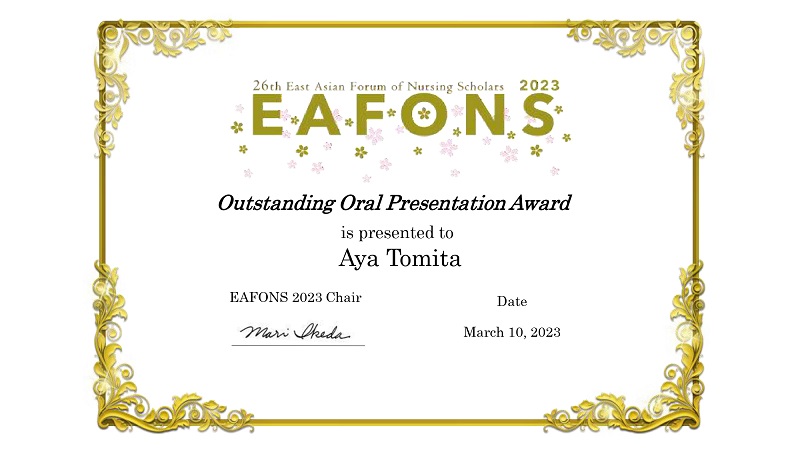Ms. Aya Tomita, a first-year Ph.D. candidate at the Department of Midwifery and Women’s Health, The University of Tokyo, received the outstanding oral presentation award at the 26th East Asian Forum of Nursing Scholars (EAFONS 2023) for the presentation titled “Factors Associated with Feeding Behavior in the Early Neonatal Period.”
Ms. Tomita and research colleagues investigated factors associated with feeding behavior, focusing on early skin-to-skin contact as a positive factor and epidural analgesia as a negative factor, by using Infant Breastfeeding Assessment Tool (IBFAT) in the early neonatal period.
Some newborns are unable to latch on successfully or tend to sleep even though healthy full-term newborns. “Breastfeeding will not proceed unless the newborn appropriately starts feeding, so it is important to focus on the instinctive feeding behavior of newborns,” said Ms. Tomita.
The IBFAT is a scale to assess instinctive feeding behaviors, which are primitive reflexes. It is often used to investigate the association between feeding behaviors and the medical interventions which mothers receive during birth. In the current study, the research team considered the IBFAT the most appropriate scale for exploring the factors associated with newborn feeding behavior. The research team found that a higher dose of epidural fentanyl during childbirth was associated with lower IBFAT scores, indicating that higher doses of fentanyl may delay newborns’ feeding behavior. On the contrary, a longer duration of early skin-to-skin contact was associated with higher IBFAT scores.
“Based on our results, it is important to conduct early skin-to-skin contact as long as possible even if mothers were administered epidural fentanyl. We want to investigate how long early skin-to-skin contact should be conducted at a given dosage of fentanyl,” said Ms. Tomita.


